Role of Royal Commission's Report in Promoting Ethical Practices in Banking Sector
VerifiedAdded on 2022/11/29
|16
|3680
|346
AI Summary
This paper examines the role of the Royal Commission's report in promoting ethical practices, accountability and integrity in the industry. The paper specifically focuses on the tasks of theoretical perspective in shaping ethical business behaviours by financial institutions. The paper comprises of five main parts. The first part is this introduction. This second part helps the reader to understand the theoretical perspective of the topic by exploring the theory of justice. The third part examines the application of the theory of justice in business. The fourth part aligns Rawls' theory of justice with what the Royal Commissioner is saying in the report. The fifth part offers a recommendation of the players in the Australian banking sector on the best ways to observe ethical behaviours.
Contribute Materials
Your contribution can guide someone’s learning journey. Share your
documents today.
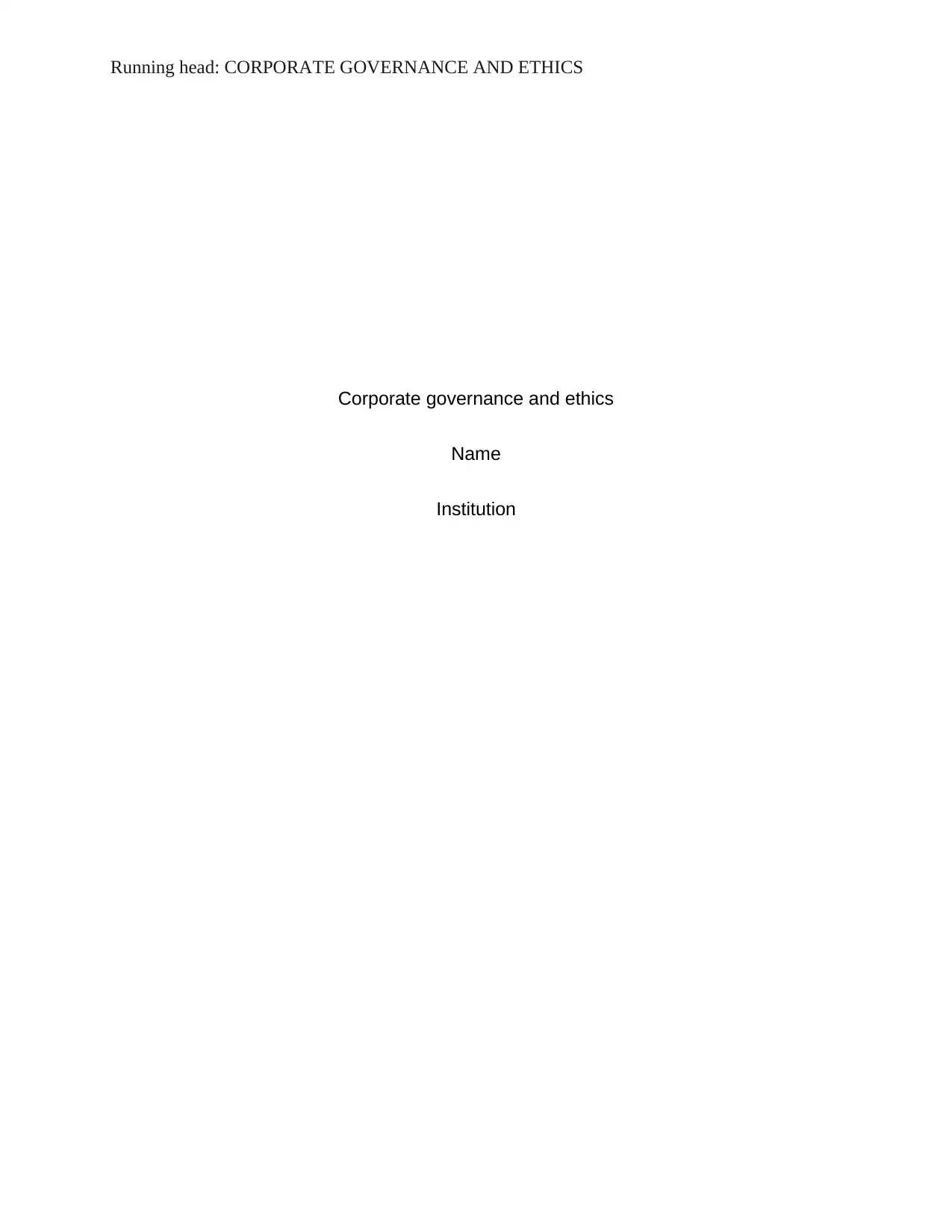
Running head: CORPORATE GOVERNANCE AND ETHICS
Corporate governance and ethics
Name
Institution
Corporate governance and ethics
Name
Institution
Secure Best Marks with AI Grader
Need help grading? Try our AI Grader for instant feedback on your assignments.
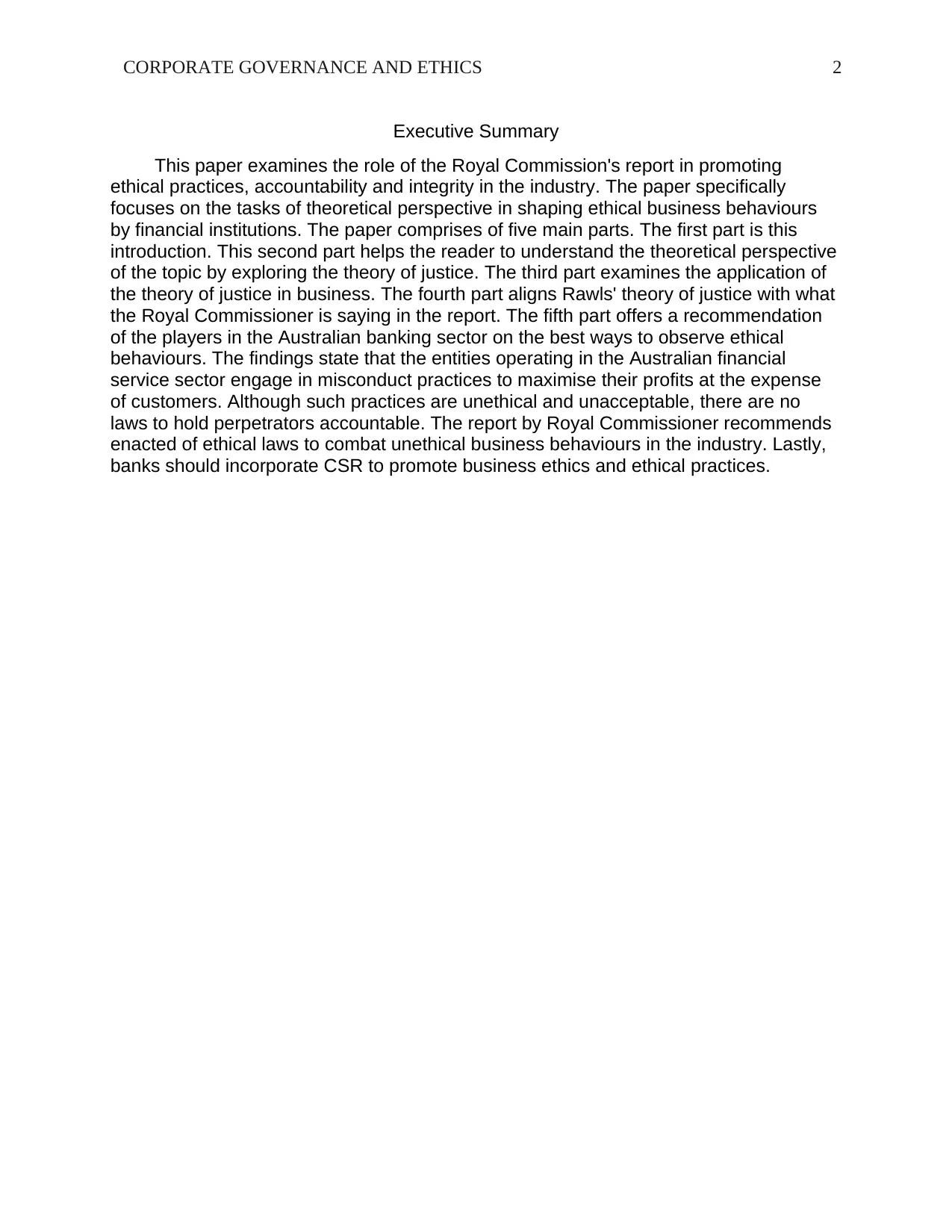
CORPORATE GOVERNANCE AND ETHICS 2
Executive Summary
This paper examines the role of the Royal Commission's report in promoting
ethical practices, accountability and integrity in the industry. The paper specifically
focuses on the tasks of theoretical perspective in shaping ethical business behaviours
by financial institutions. The paper comprises of five main parts. The first part is this
introduction. This second part helps the reader to understand the theoretical perspective
of the topic by exploring the theory of justice. The third part examines the application of
the theory of justice in business. The fourth part aligns Rawls' theory of justice with what
the Royal Commissioner is saying in the report. The fifth part offers a recommendation
of the players in the Australian banking sector on the best ways to observe ethical
behaviours. The findings state that the entities operating in the Australian financial
service sector engage in misconduct practices to maximise their profits at the expense
of customers. Although such practices are unethical and unacceptable, there are no
laws to hold perpetrators accountable. The report by Royal Commissioner recommends
enacted of ethical laws to combat unethical business behaviours in the industry. Lastly,
banks should incorporate CSR to promote business ethics and ethical practices.
Executive Summary
This paper examines the role of the Royal Commission's report in promoting
ethical practices, accountability and integrity in the industry. The paper specifically
focuses on the tasks of theoretical perspective in shaping ethical business behaviours
by financial institutions. The paper comprises of five main parts. The first part is this
introduction. This second part helps the reader to understand the theoretical perspective
of the topic by exploring the theory of justice. The third part examines the application of
the theory of justice in business. The fourth part aligns Rawls' theory of justice with what
the Royal Commissioner is saying in the report. The fifth part offers a recommendation
of the players in the Australian banking sector on the best ways to observe ethical
behaviours. The findings state that the entities operating in the Australian financial
service sector engage in misconduct practices to maximise their profits at the expense
of customers. Although such practices are unethical and unacceptable, there are no
laws to hold perpetrators accountable. The report by Royal Commissioner recommends
enacted of ethical laws to combat unethical business behaviours in the industry. Lastly,
banks should incorporate CSR to promote business ethics and ethical practices.
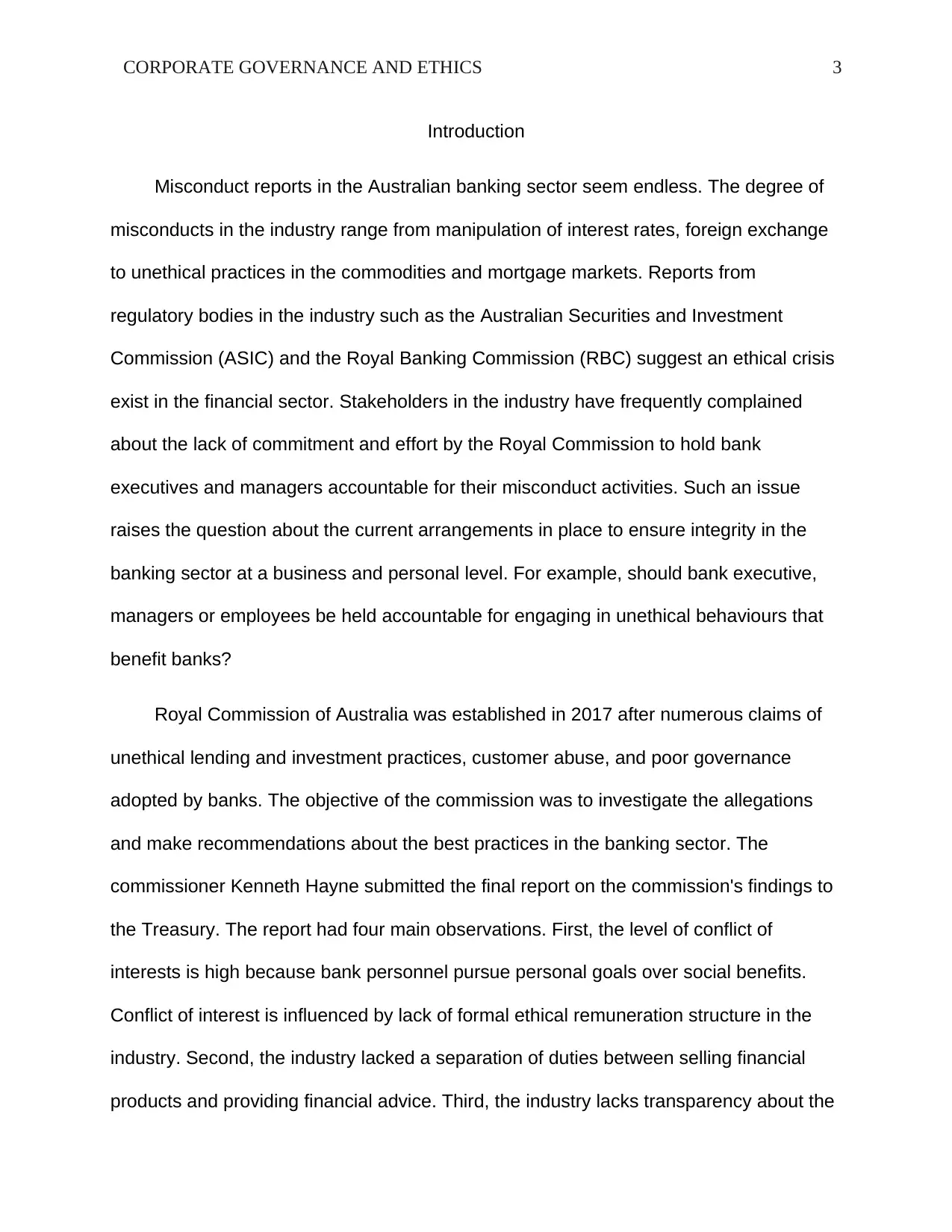
CORPORATE GOVERNANCE AND ETHICS 3
Introduction
Misconduct reports in the Australian banking sector seem endless. The degree of
misconducts in the industry range from manipulation of interest rates, foreign exchange
to unethical practices in the commodities and mortgage markets. Reports from
regulatory bodies in the industry such as the Australian Securities and Investment
Commission (ASIC) and the Royal Banking Commission (RBC) suggest an ethical crisis
exist in the financial sector. Stakeholders in the industry have frequently complained
about the lack of commitment and effort by the Royal Commission to hold bank
executives and managers accountable for their misconduct activities. Such an issue
raises the question about the current arrangements in place to ensure integrity in the
banking sector at a business and personal level. For example, should bank executive,
managers or employees be held accountable for engaging in unethical behaviours that
benefit banks?
Royal Commission of Australia was established in 2017 after numerous claims of
unethical lending and investment practices, customer abuse, and poor governance
adopted by banks. The objective of the commission was to investigate the allegations
and make recommendations about the best practices in the banking sector. The
commissioner Kenneth Hayne submitted the final report on the commission's findings to
the Treasury. The report had four main observations. First, the level of conflict of
interests is high because bank personnel pursue personal goals over social benefits.
Conflict of interest is influenced by lack of formal ethical remuneration structure in the
industry. Second, the industry lacked a separation of duties between selling financial
products and providing financial advice. Third, the industry lacks transparency about the
Introduction
Misconduct reports in the Australian banking sector seem endless. The degree of
misconducts in the industry range from manipulation of interest rates, foreign exchange
to unethical practices in the commodities and mortgage markets. Reports from
regulatory bodies in the industry such as the Australian Securities and Investment
Commission (ASIC) and the Royal Banking Commission (RBC) suggest an ethical crisis
exist in the financial sector. Stakeholders in the industry have frequently complained
about the lack of commitment and effort by the Royal Commission to hold bank
executives and managers accountable for their misconduct activities. Such an issue
raises the question about the current arrangements in place to ensure integrity in the
banking sector at a business and personal level. For example, should bank executive,
managers or employees be held accountable for engaging in unethical behaviours that
benefit banks?
Royal Commission of Australia was established in 2017 after numerous claims of
unethical lending and investment practices, customer abuse, and poor governance
adopted by banks. The objective of the commission was to investigate the allegations
and make recommendations about the best practices in the banking sector. The
commissioner Kenneth Hayne submitted the final report on the commission's findings to
the Treasury. The report had four main observations. First, the level of conflict of
interests is high because bank personnel pursue personal goals over social benefits.
Conflict of interest is influenced by lack of formal ethical remuneration structure in the
industry. Second, the industry lacked a separation of duties between selling financial
products and providing financial advice. Third, the industry lacks transparency about the
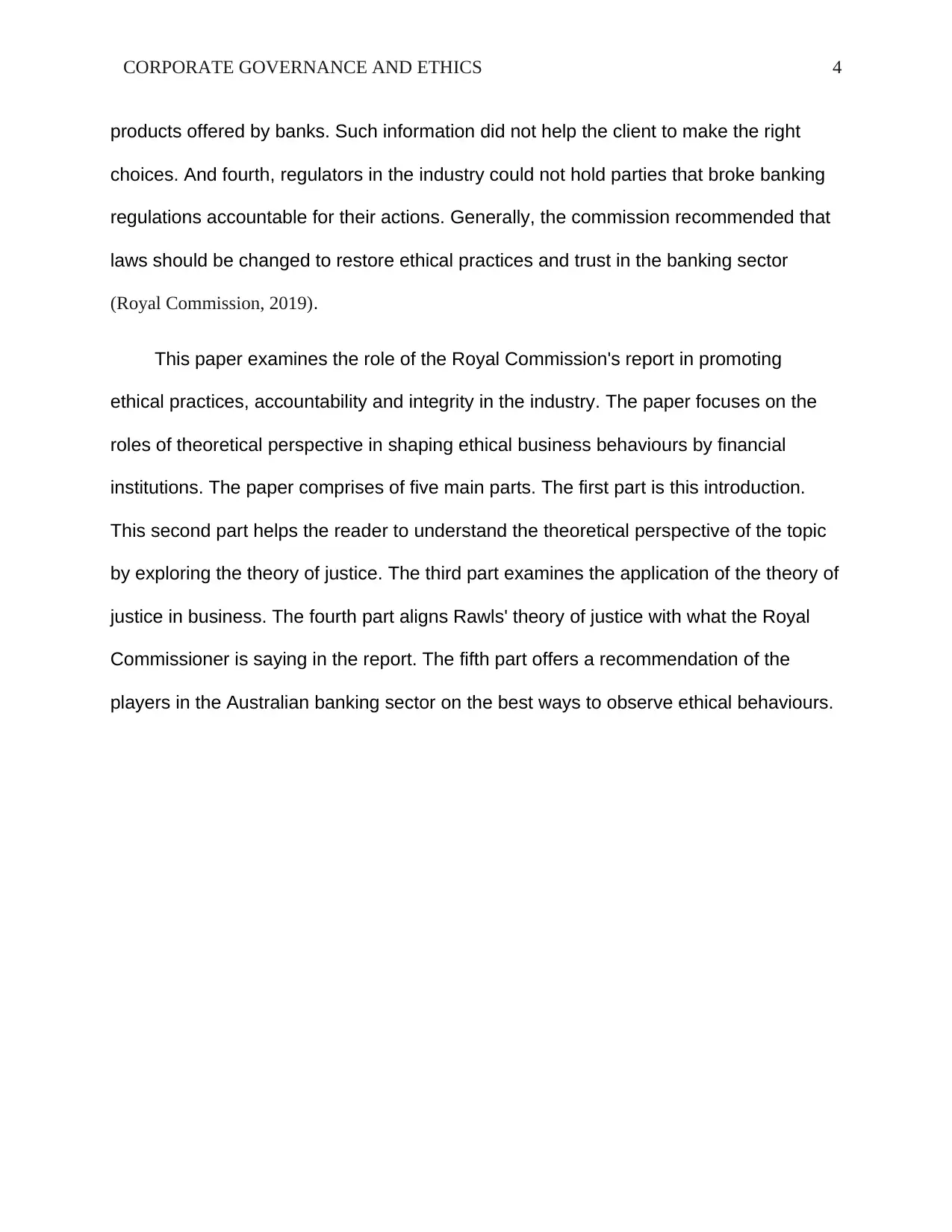
CORPORATE GOVERNANCE AND ETHICS 4
products offered by banks. Such information did not help the client to make the right
choices. And fourth, regulators in the industry could not hold parties that broke banking
regulations accountable for their actions. Generally, the commission recommended that
laws should be changed to restore ethical practices and trust in the banking sector
(Royal Commission, 2019).
This paper examines the role of the Royal Commission's report in promoting
ethical practices, accountability and integrity in the industry. The paper focuses on the
roles of theoretical perspective in shaping ethical business behaviours by financial
institutions. The paper comprises of five main parts. The first part is this introduction.
This second part helps the reader to understand the theoretical perspective of the topic
by exploring the theory of justice. The third part examines the application of the theory of
justice in business. The fourth part aligns Rawls' theory of justice with what the Royal
Commissioner is saying in the report. The fifth part offers a recommendation of the
players in the Australian banking sector on the best ways to observe ethical behaviours.
products offered by banks. Such information did not help the client to make the right
choices. And fourth, regulators in the industry could not hold parties that broke banking
regulations accountable for their actions. Generally, the commission recommended that
laws should be changed to restore ethical practices and trust in the banking sector
(Royal Commission, 2019).
This paper examines the role of the Royal Commission's report in promoting
ethical practices, accountability and integrity in the industry. The paper focuses on the
roles of theoretical perspective in shaping ethical business behaviours by financial
institutions. The paper comprises of five main parts. The first part is this introduction.
This second part helps the reader to understand the theoretical perspective of the topic
by exploring the theory of justice. The third part examines the application of the theory of
justice in business. The fourth part aligns Rawls' theory of justice with what the Royal
Commissioner is saying in the report. The fifth part offers a recommendation of the
players in the Australian banking sector on the best ways to observe ethical behaviours.
Secure Best Marks with AI Grader
Need help grading? Try our AI Grader for instant feedback on your assignments.
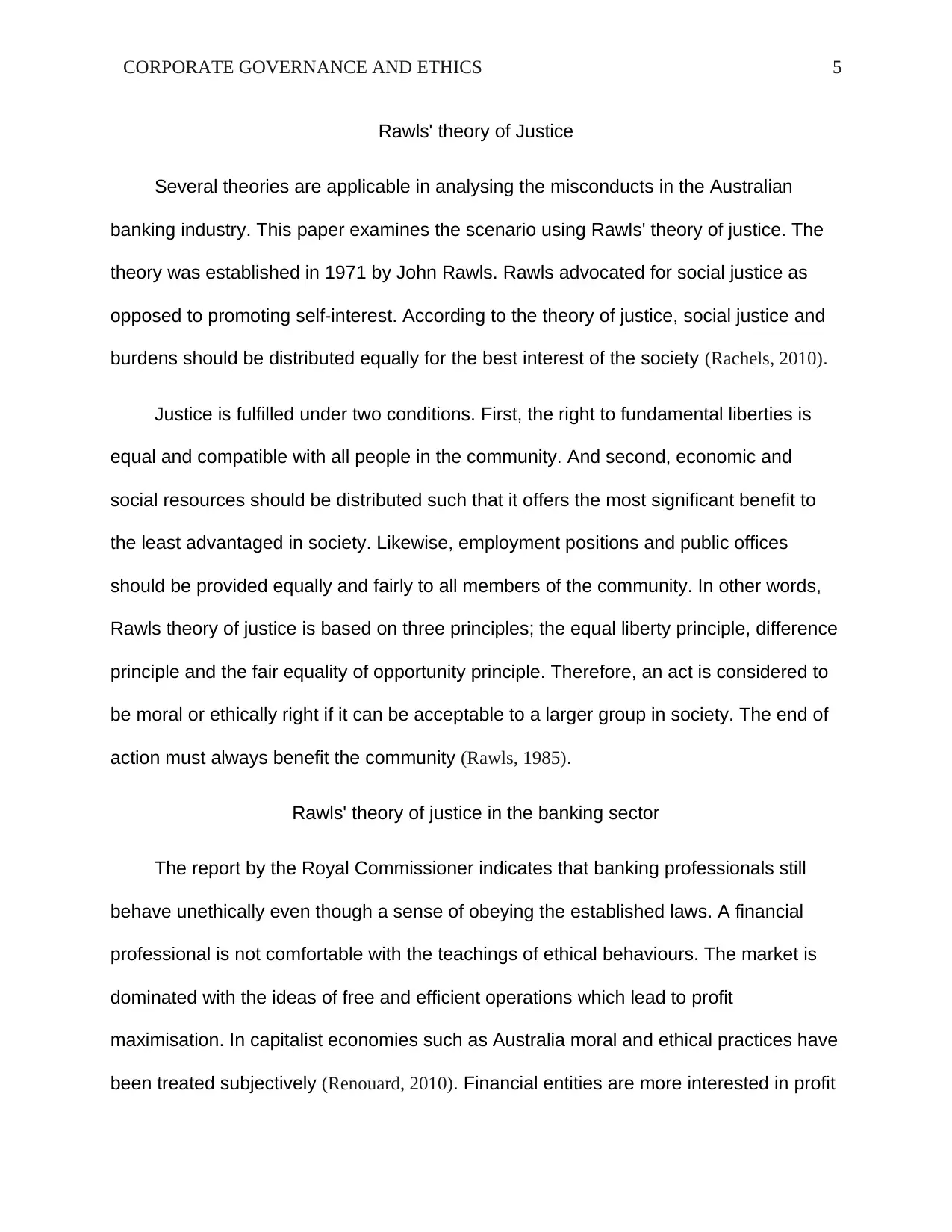
CORPORATE GOVERNANCE AND ETHICS 5
Rawls' theory of Justice
Several theories are applicable in analysing the misconducts in the Australian
banking industry. This paper examines the scenario using Rawls' theory of justice. The
theory was established in 1971 by John Rawls. Rawls advocated for social justice as
opposed to promoting self-interest. According to the theory of justice, social justice and
burdens should be distributed equally for the best interest of the society (Rachels, 2010).
Justice is fulfilled under two conditions. First, the right to fundamental liberties is
equal and compatible with all people in the community. And second, economic and
social resources should be distributed such that it offers the most significant benefit to
the least advantaged in society. Likewise, employment positions and public offices
should be provided equally and fairly to all members of the community. In other words,
Rawls theory of justice is based on three principles; the equal liberty principle, difference
principle and the fair equality of opportunity principle. Therefore, an act is considered to
be moral or ethically right if it can be acceptable to a larger group in society. The end of
action must always benefit the community (Rawls, 1985).
Rawls' theory of justice in the banking sector
The report by the Royal Commissioner indicates that banking professionals still
behave unethically even though a sense of obeying the established laws. A financial
professional is not comfortable with the teachings of ethical behaviours. The market is
dominated with the ideas of free and efficient operations which lead to profit
maximisation. In capitalist economies such as Australia moral and ethical practices have
been treated subjectively (Renouard, 2010). Financial entities are more interested in profit
Rawls' theory of Justice
Several theories are applicable in analysing the misconducts in the Australian
banking industry. This paper examines the scenario using Rawls' theory of justice. The
theory was established in 1971 by John Rawls. Rawls advocated for social justice as
opposed to promoting self-interest. According to the theory of justice, social justice and
burdens should be distributed equally for the best interest of the society (Rachels, 2010).
Justice is fulfilled under two conditions. First, the right to fundamental liberties is
equal and compatible with all people in the community. And second, economic and
social resources should be distributed such that it offers the most significant benefit to
the least advantaged in society. Likewise, employment positions and public offices
should be provided equally and fairly to all members of the community. In other words,
Rawls theory of justice is based on three principles; the equal liberty principle, difference
principle and the fair equality of opportunity principle. Therefore, an act is considered to
be moral or ethically right if it can be acceptable to a larger group in society. The end of
action must always benefit the community (Rawls, 1985).
Rawls' theory of justice in the banking sector
The report by the Royal Commissioner indicates that banking professionals still
behave unethically even though a sense of obeying the established laws. A financial
professional is not comfortable with the teachings of ethical behaviours. The market is
dominated with the ideas of free and efficient operations which lead to profit
maximisation. In capitalist economies such as Australia moral and ethical practices have
been treated subjectively (Renouard, 2010). Financial entities are more interested in profit
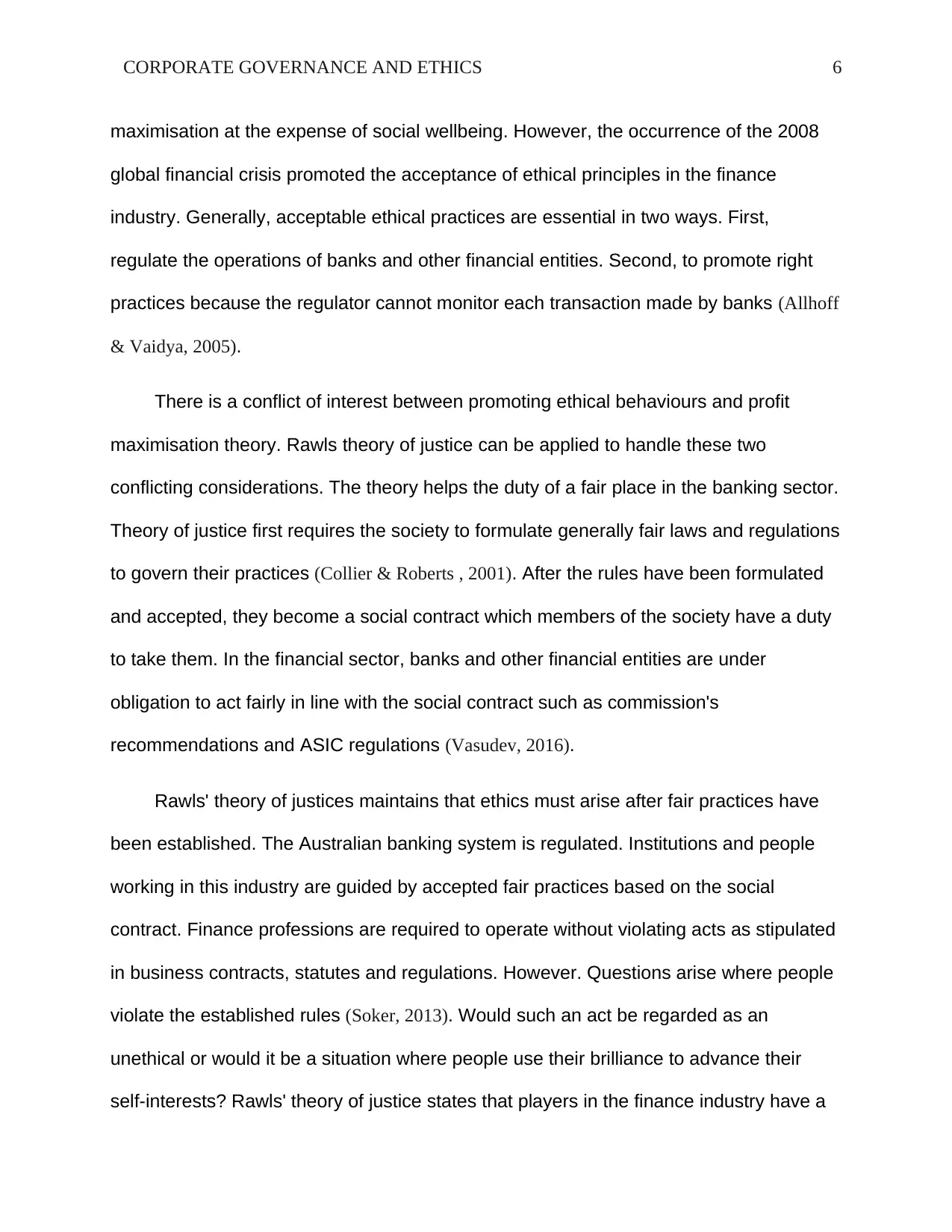
CORPORATE GOVERNANCE AND ETHICS 6
maximisation at the expense of social wellbeing. However, the occurrence of the 2008
global financial crisis promoted the acceptance of ethical principles in the finance
industry. Generally, acceptable ethical practices are essential in two ways. First,
regulate the operations of banks and other financial entities. Second, to promote right
practices because the regulator cannot monitor each transaction made by banks (Allhoff
& Vaidya, 2005).
There is a conflict of interest between promoting ethical behaviours and profit
maximisation theory. Rawls theory of justice can be applied to handle these two
conflicting considerations. The theory helps the duty of a fair place in the banking sector.
Theory of justice first requires the society to formulate generally fair laws and regulations
to govern their practices (Collier & Roberts , 2001). After the rules have been formulated
and accepted, they become a social contract which members of the society have a duty
to take them. In the financial sector, banks and other financial entities are under
obligation to act fairly in line with the social contract such as commission's
recommendations and ASIC regulations (Vasudev, 2016).
Rawls' theory of justices maintains that ethics must arise after fair practices have
been established. The Australian banking system is regulated. Institutions and people
working in this industry are guided by accepted fair practices based on the social
contract. Finance professions are required to operate without violating acts as stipulated
in business contracts, statutes and regulations. However. Questions arise where people
violate the established rules (Soker, 2013). Would such an act be regarded as an
unethical or would it be a situation where people use their brilliance to advance their
self-interests? Rawls' theory of justice states that players in the finance industry have a
maximisation at the expense of social wellbeing. However, the occurrence of the 2008
global financial crisis promoted the acceptance of ethical principles in the finance
industry. Generally, acceptable ethical practices are essential in two ways. First,
regulate the operations of banks and other financial entities. Second, to promote right
practices because the regulator cannot monitor each transaction made by banks (Allhoff
& Vaidya, 2005).
There is a conflict of interest between promoting ethical behaviours and profit
maximisation theory. Rawls theory of justice can be applied to handle these two
conflicting considerations. The theory helps the duty of a fair place in the banking sector.
Theory of justice first requires the society to formulate generally fair laws and regulations
to govern their practices (Collier & Roberts , 2001). After the rules have been formulated
and accepted, they become a social contract which members of the society have a duty
to take them. In the financial sector, banks and other financial entities are under
obligation to act fairly in line with the social contract such as commission's
recommendations and ASIC regulations (Vasudev, 2016).
Rawls' theory of justices maintains that ethics must arise after fair practices have
been established. The Australian banking system is regulated. Institutions and people
working in this industry are guided by accepted fair practices based on the social
contract. Finance professions are required to operate without violating acts as stipulated
in business contracts, statutes and regulations. However. Questions arise where people
violate the established rules (Soker, 2013). Would such an act be regarded as an
unethical or would it be a situation where people use their brilliance to advance their
self-interests? Rawls' theory of justice states that players in the finance industry have a
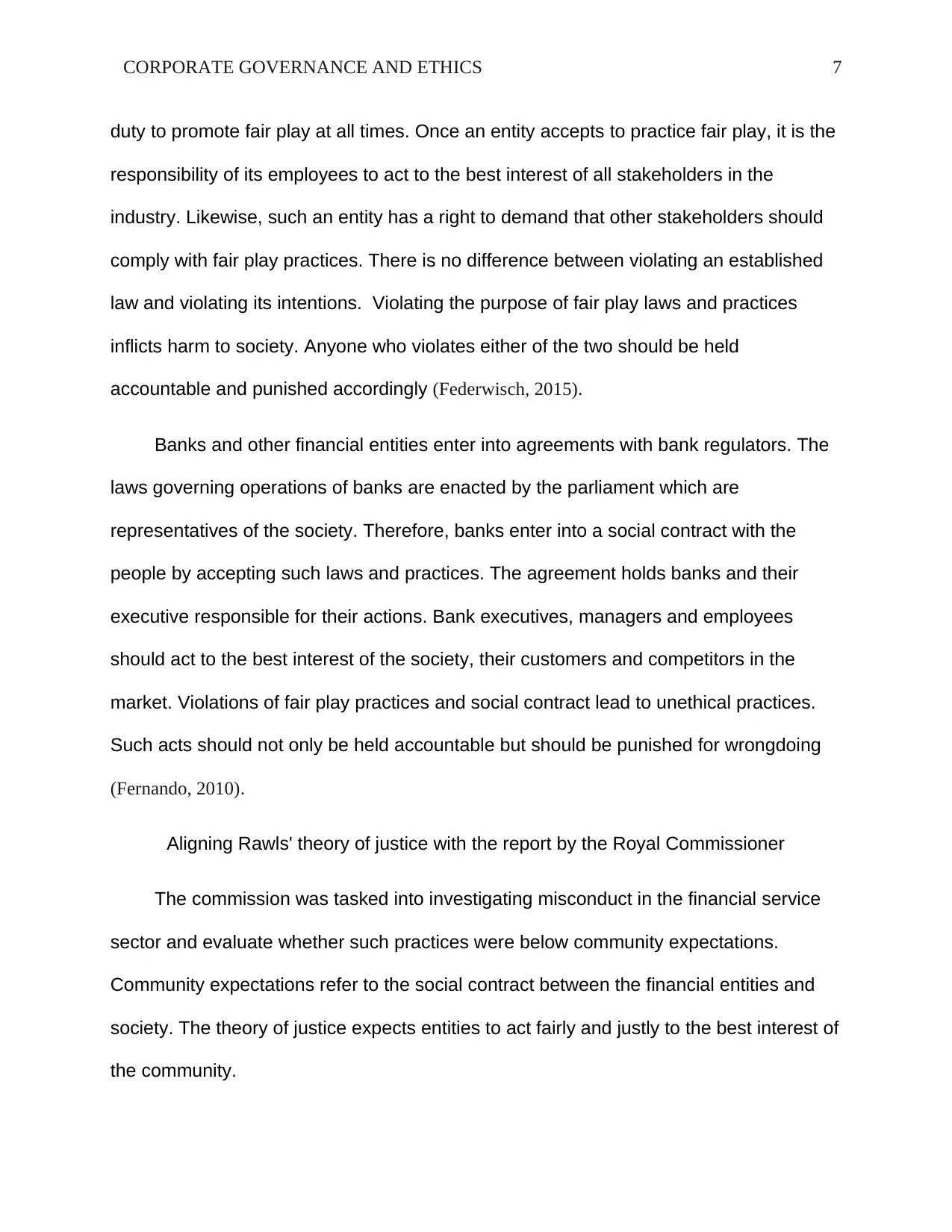
CORPORATE GOVERNANCE AND ETHICS 7
duty to promote fair play at all times. Once an entity accepts to practice fair play, it is the
responsibility of its employees to act to the best interest of all stakeholders in the
industry. Likewise, such an entity has a right to demand that other stakeholders should
comply with fair play practices. There is no difference between violating an established
law and violating its intentions. Violating the purpose of fair play laws and practices
inflicts harm to society. Anyone who violates either of the two should be held
accountable and punished accordingly (Federwisch, 2015).
Banks and other financial entities enter into agreements with bank regulators. The
laws governing operations of banks are enacted by the parliament which are
representatives of the society. Therefore, banks enter into a social contract with the
people by accepting such laws and practices. The agreement holds banks and their
executive responsible for their actions. Bank executives, managers and employees
should act to the best interest of the society, their customers and competitors in the
market. Violations of fair play practices and social contract lead to unethical practices.
Such acts should not only be held accountable but should be punished for wrongdoing
(Fernando, 2010).
Aligning Rawls' theory of justice with the report by the Royal Commissioner
The commission was tasked into investigating misconduct in the financial service
sector and evaluate whether such practices were below community expectations.
Community expectations refer to the social contract between the financial entities and
society. The theory of justice expects entities to act fairly and justly to the best interest of
the community.
duty to promote fair play at all times. Once an entity accepts to practice fair play, it is the
responsibility of its employees to act to the best interest of all stakeholders in the
industry. Likewise, such an entity has a right to demand that other stakeholders should
comply with fair play practices. There is no difference between violating an established
law and violating its intentions. Violating the purpose of fair play laws and practices
inflicts harm to society. Anyone who violates either of the two should be held
accountable and punished accordingly (Federwisch, 2015).
Banks and other financial entities enter into agreements with bank regulators. The
laws governing operations of banks are enacted by the parliament which are
representatives of the society. Therefore, banks enter into a social contract with the
people by accepting such laws and practices. The agreement holds banks and their
executive responsible for their actions. Bank executives, managers and employees
should act to the best interest of the society, their customers and competitors in the
market. Violations of fair play practices and social contract lead to unethical practices.
Such acts should not only be held accountable but should be punished for wrongdoing
(Fernando, 2010).
Aligning Rawls' theory of justice with the report by the Royal Commissioner
The commission was tasked into investigating misconduct in the financial service
sector and evaluate whether such practices were below community expectations.
Community expectations refer to the social contract between the financial entities and
society. The theory of justice expects entities to act fairly and justly to the best interest of
the community.
Paraphrase This Document
Need a fresh take? Get an instant paraphrase of this document with our AI Paraphraser
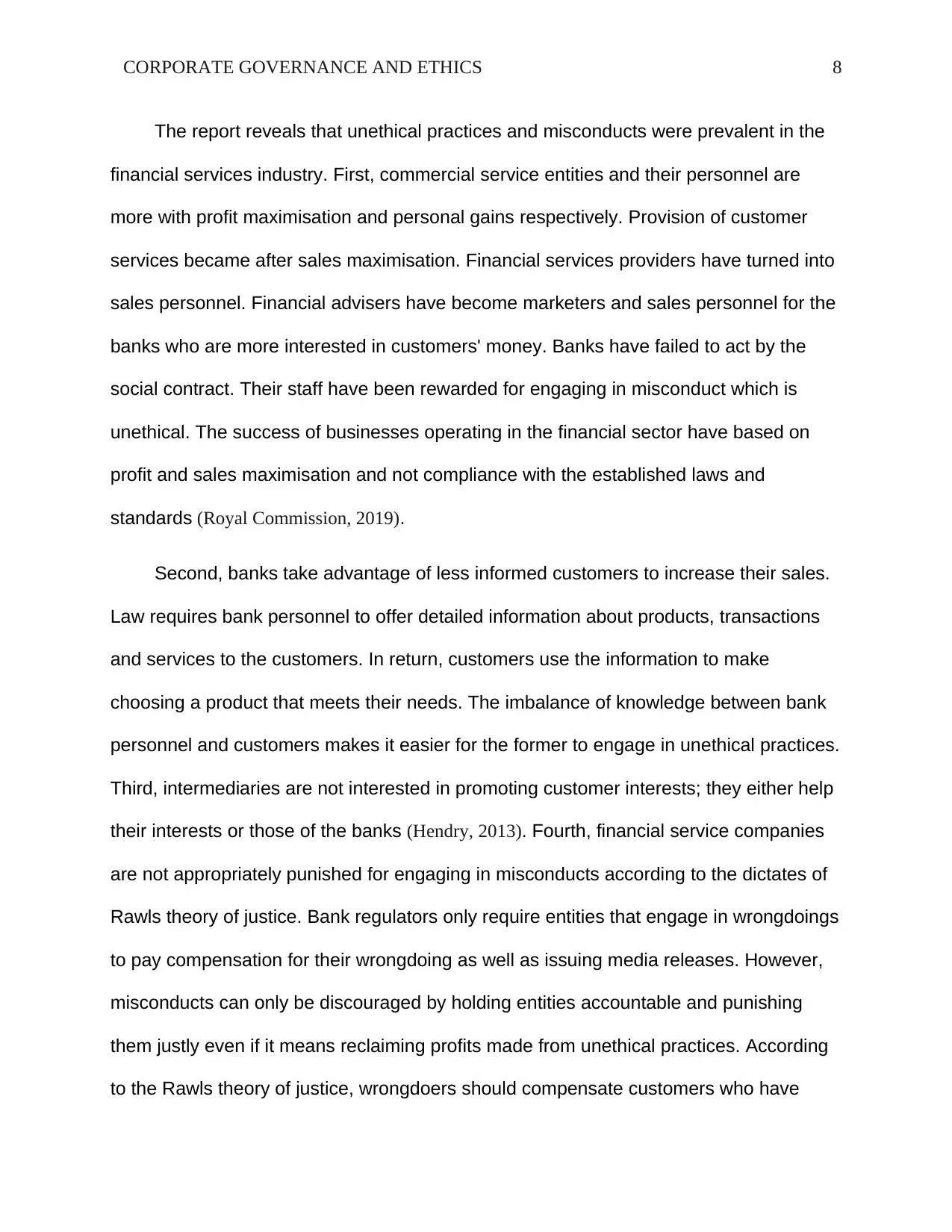
CORPORATE GOVERNANCE AND ETHICS 8
The report reveals that unethical practices and misconducts were prevalent in the
financial services industry. First, commercial service entities and their personnel are
more with profit maximisation and personal gains respectively. Provision of customer
services became after sales maximisation. Financial services providers have turned into
sales personnel. Financial advisers have become marketers and sales personnel for the
banks who are more interested in customers' money. Banks have failed to act by the
social contract. Their staff have been rewarded for engaging in misconduct which is
unethical. The success of businesses operating in the financial sector have based on
profit and sales maximisation and not compliance with the established laws and
standards (Royal Commission, 2019).
Second, banks take advantage of less informed customers to increase their sales.
Law requires bank personnel to offer detailed information about products, transactions
and services to the customers. In return, customers use the information to make
choosing a product that meets their needs. The imbalance of knowledge between bank
personnel and customers makes it easier for the former to engage in unethical practices.
Third, intermediaries are not interested in promoting customer interests; they either help
their interests or those of the banks (Hendry, 2013). Fourth, financial service companies
are not appropriately punished for engaging in misconducts according to the dictates of
Rawls theory of justice. Bank regulators only require entities that engage in wrongdoings
to pay compensation for their wrongdoing as well as issuing media releases. However,
misconducts can only be discouraged by holding entities accountable and punishing
them justly even if it means reclaiming profits made from unethical practices. According
to the Rawls theory of justice, wrongdoers should compensate customers who have
The report reveals that unethical practices and misconducts were prevalent in the
financial services industry. First, commercial service entities and their personnel are
more with profit maximisation and personal gains respectively. Provision of customer
services became after sales maximisation. Financial services providers have turned into
sales personnel. Financial advisers have become marketers and sales personnel for the
banks who are more interested in customers' money. Banks have failed to act by the
social contract. Their staff have been rewarded for engaging in misconduct which is
unethical. The success of businesses operating in the financial sector have based on
profit and sales maximisation and not compliance with the established laws and
standards (Royal Commission, 2019).
Second, banks take advantage of less informed customers to increase their sales.
Law requires bank personnel to offer detailed information about products, transactions
and services to the customers. In return, customers use the information to make
choosing a product that meets their needs. The imbalance of knowledge between bank
personnel and customers makes it easier for the former to engage in unethical practices.
Third, intermediaries are not interested in promoting customer interests; they either help
their interests or those of the banks (Hendry, 2013). Fourth, financial service companies
are not appropriately punished for engaging in misconducts according to the dictates of
Rawls theory of justice. Bank regulators only require entities that engage in wrongdoings
to pay compensation for their wrongdoing as well as issuing media releases. However,
misconducts can only be discouraged by holding entities accountable and punishing
them justly even if it means reclaiming profits made from unethical practices. According
to the Rawls theory of justice, wrongdoers should compensate customers who have
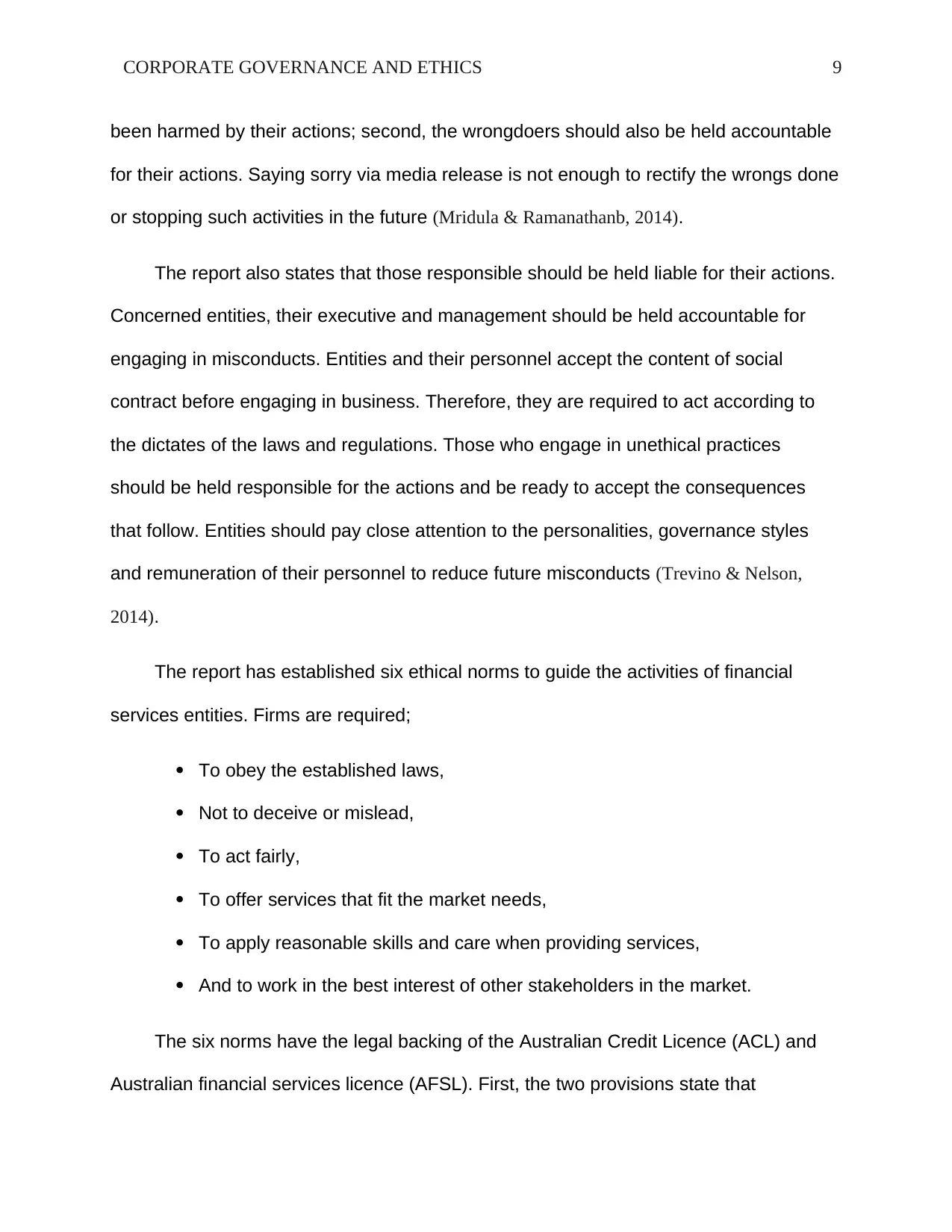
CORPORATE GOVERNANCE AND ETHICS 9
been harmed by their actions; second, the wrongdoers should also be held accountable
for their actions. Saying sorry via media release is not enough to rectify the wrongs done
or stopping such activities in the future (Mridula & Ramanathanb, 2014).
The report also states that those responsible should be held liable for their actions.
Concerned entities, their executive and management should be held accountable for
engaging in misconducts. Entities and their personnel accept the content of social
contract before engaging in business. Therefore, they are required to act according to
the dictates of the laws and regulations. Those who engage in unethical practices
should be held responsible for the actions and be ready to accept the consequences
that follow. Entities should pay close attention to the personalities, governance styles
and remuneration of their personnel to reduce future misconducts (Trevino & Nelson,
2014).
The report has established six ethical norms to guide the activities of financial
services entities. Firms are required;
To obey the established laws,
Not to deceive or mislead,
To act fairly,
To offer services that fit the market needs,
To apply reasonable skills and care when providing services,
And to work in the best interest of other stakeholders in the market.
The six norms have the legal backing of the Australian Credit Licence (ACL) and
Australian financial services licence (AFSL). First, the two provisions state that
been harmed by their actions; second, the wrongdoers should also be held accountable
for their actions. Saying sorry via media release is not enough to rectify the wrongs done
or stopping such activities in the future (Mridula & Ramanathanb, 2014).
The report also states that those responsible should be held liable for their actions.
Concerned entities, their executive and management should be held accountable for
engaging in misconducts. Entities and their personnel accept the content of social
contract before engaging in business. Therefore, they are required to act according to
the dictates of the laws and regulations. Those who engage in unethical practices
should be held responsible for the actions and be ready to accept the consequences
that follow. Entities should pay close attention to the personalities, governance styles
and remuneration of their personnel to reduce future misconducts (Trevino & Nelson,
2014).
The report has established six ethical norms to guide the activities of financial
services entities. Firms are required;
To obey the established laws,
Not to deceive or mislead,
To act fairly,
To offer services that fit the market needs,
To apply reasonable skills and care when providing services,
And to work in the best interest of other stakeholders in the market.
The six norms have the legal backing of the Australian Credit Licence (ACL) and
Australian financial services licence (AFSL). First, the two provisions state that
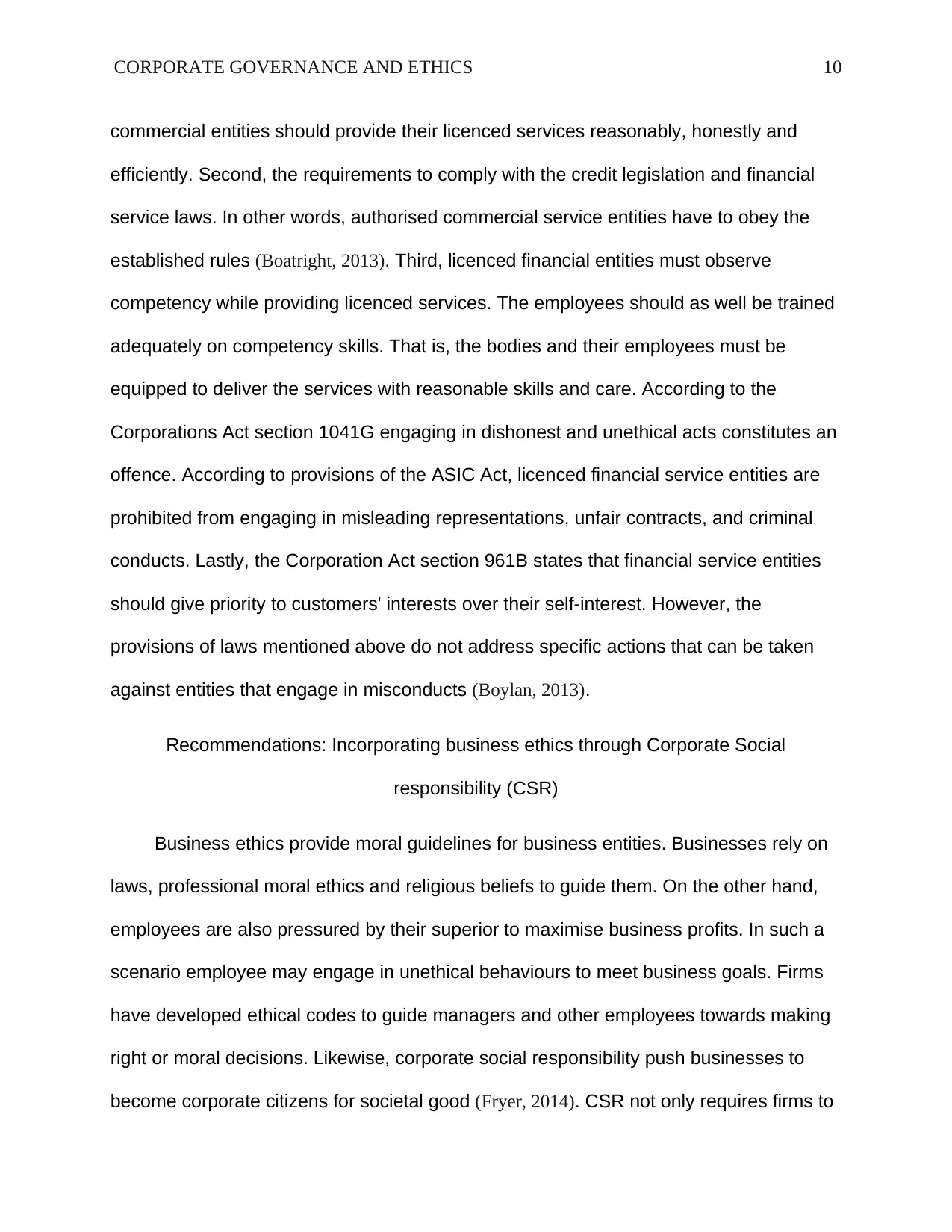
CORPORATE GOVERNANCE AND ETHICS 10
commercial entities should provide their licenced services reasonably, honestly and
efficiently. Second, the requirements to comply with the credit legislation and financial
service laws. In other words, authorised commercial service entities have to obey the
established rules (Boatright, 2013). Third, licenced financial entities must observe
competency while providing licenced services. The employees should as well be trained
adequately on competency skills. That is, the bodies and their employees must be
equipped to deliver the services with reasonable skills and care. According to the
Corporations Act section 1041G engaging in dishonest and unethical acts constitutes an
offence. According to provisions of the ASIC Act, licenced financial service entities are
prohibited from engaging in misleading representations, unfair contracts, and criminal
conducts. Lastly, the Corporation Act section 961B states that financial service entities
should give priority to customers' interests over their self-interest. However, the
provisions of laws mentioned above do not address specific actions that can be taken
against entities that engage in misconducts (Boylan, 2013).
Recommendations: Incorporating business ethics through Corporate Social
responsibility (CSR)
Business ethics provide moral guidelines for business entities. Businesses rely on
laws, professional moral ethics and religious beliefs to guide them. On the other hand,
employees are also pressured by their superior to maximise business profits. In such a
scenario employee may engage in unethical behaviours to meet business goals. Firms
have developed ethical codes to guide managers and other employees towards making
right or moral decisions. Likewise, corporate social responsibility push businesses to
become corporate citizens for societal good (Fryer, 2014). CSR not only requires firms to
commercial entities should provide their licenced services reasonably, honestly and
efficiently. Second, the requirements to comply with the credit legislation and financial
service laws. In other words, authorised commercial service entities have to obey the
established rules (Boatright, 2013). Third, licenced financial entities must observe
competency while providing licenced services. The employees should as well be trained
adequately on competency skills. That is, the bodies and their employees must be
equipped to deliver the services with reasonable skills and care. According to the
Corporations Act section 1041G engaging in dishonest and unethical acts constitutes an
offence. According to provisions of the ASIC Act, licenced financial service entities are
prohibited from engaging in misleading representations, unfair contracts, and criminal
conducts. Lastly, the Corporation Act section 961B states that financial service entities
should give priority to customers' interests over their self-interest. However, the
provisions of laws mentioned above do not address specific actions that can be taken
against entities that engage in misconducts (Boylan, 2013).
Recommendations: Incorporating business ethics through Corporate Social
responsibility (CSR)
Business ethics provide moral guidelines for business entities. Businesses rely on
laws, professional moral ethics and religious beliefs to guide them. On the other hand,
employees are also pressured by their superior to maximise business profits. In such a
scenario employee may engage in unethical behaviours to meet business goals. Firms
have developed ethical codes to guide managers and other employees towards making
right or moral decisions. Likewise, corporate social responsibility push businesses to
become corporate citizens for societal good (Fryer, 2014). CSR not only requires firms to
Secure Best Marks with AI Grader
Need help grading? Try our AI Grader for instant feedback on your assignments.
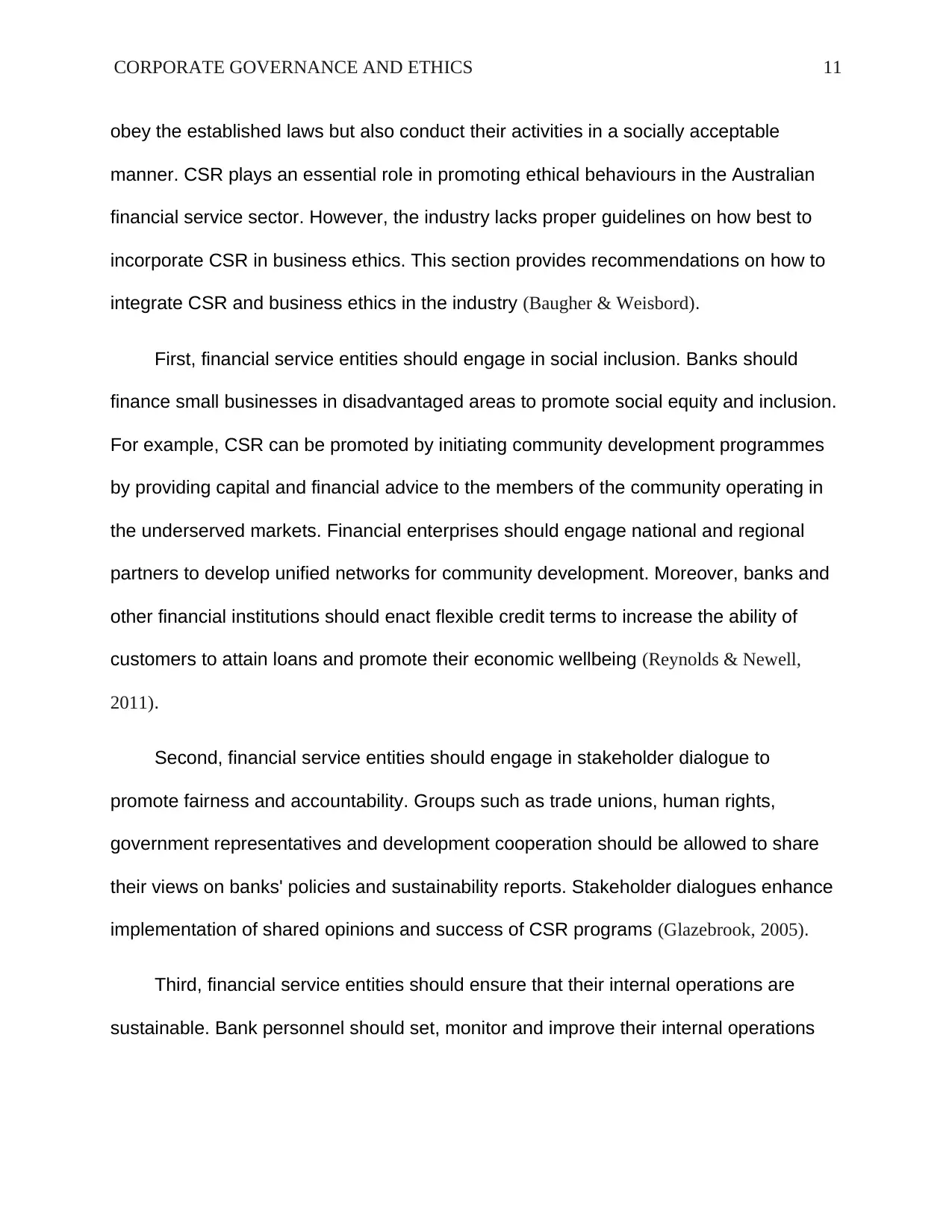
CORPORATE GOVERNANCE AND ETHICS 11
obey the established laws but also conduct their activities in a socially acceptable
manner. CSR plays an essential role in promoting ethical behaviours in the Australian
financial service sector. However, the industry lacks proper guidelines on how best to
incorporate CSR in business ethics. This section provides recommendations on how to
integrate CSR and business ethics in the industry (Baugher & Weisbord).
First, financial service entities should engage in social inclusion. Banks should
finance small businesses in disadvantaged areas to promote social equity and inclusion.
For example, CSR can be promoted by initiating community development programmes
by providing capital and financial advice to the members of the community operating in
the underserved markets. Financial enterprises should engage national and regional
partners to develop unified networks for community development. Moreover, banks and
other financial institutions should enact flexible credit terms to increase the ability of
customers to attain loans and promote their economic wellbeing (Reynolds & Newell,
2011).
Second, financial service entities should engage in stakeholder dialogue to
promote fairness and accountability. Groups such as trade unions, human rights,
government representatives and development cooperation should be allowed to share
their views on banks' policies and sustainability reports. Stakeholder dialogues enhance
implementation of shared opinions and success of CSR programs (Glazebrook, 2005).
Third, financial service entities should ensure that their internal operations are
sustainable. Bank personnel should set, monitor and improve their internal operations
obey the established laws but also conduct their activities in a socially acceptable
manner. CSR plays an essential role in promoting ethical behaviours in the Australian
financial service sector. However, the industry lacks proper guidelines on how best to
incorporate CSR in business ethics. This section provides recommendations on how to
integrate CSR and business ethics in the industry (Baugher & Weisbord).
First, financial service entities should engage in social inclusion. Banks should
finance small businesses in disadvantaged areas to promote social equity and inclusion.
For example, CSR can be promoted by initiating community development programmes
by providing capital and financial advice to the members of the community operating in
the underserved markets. Financial enterprises should engage national and regional
partners to develop unified networks for community development. Moreover, banks and
other financial institutions should enact flexible credit terms to increase the ability of
customers to attain loans and promote their economic wellbeing (Reynolds & Newell,
2011).
Second, financial service entities should engage in stakeholder dialogue to
promote fairness and accountability. Groups such as trade unions, human rights,
government representatives and development cooperation should be allowed to share
their views on banks' policies and sustainability reports. Stakeholder dialogues enhance
implementation of shared opinions and success of CSR programs (Glazebrook, 2005).
Third, financial service entities should ensure that their internal operations are
sustainable. Bank personnel should set, monitor and improve their internal operations
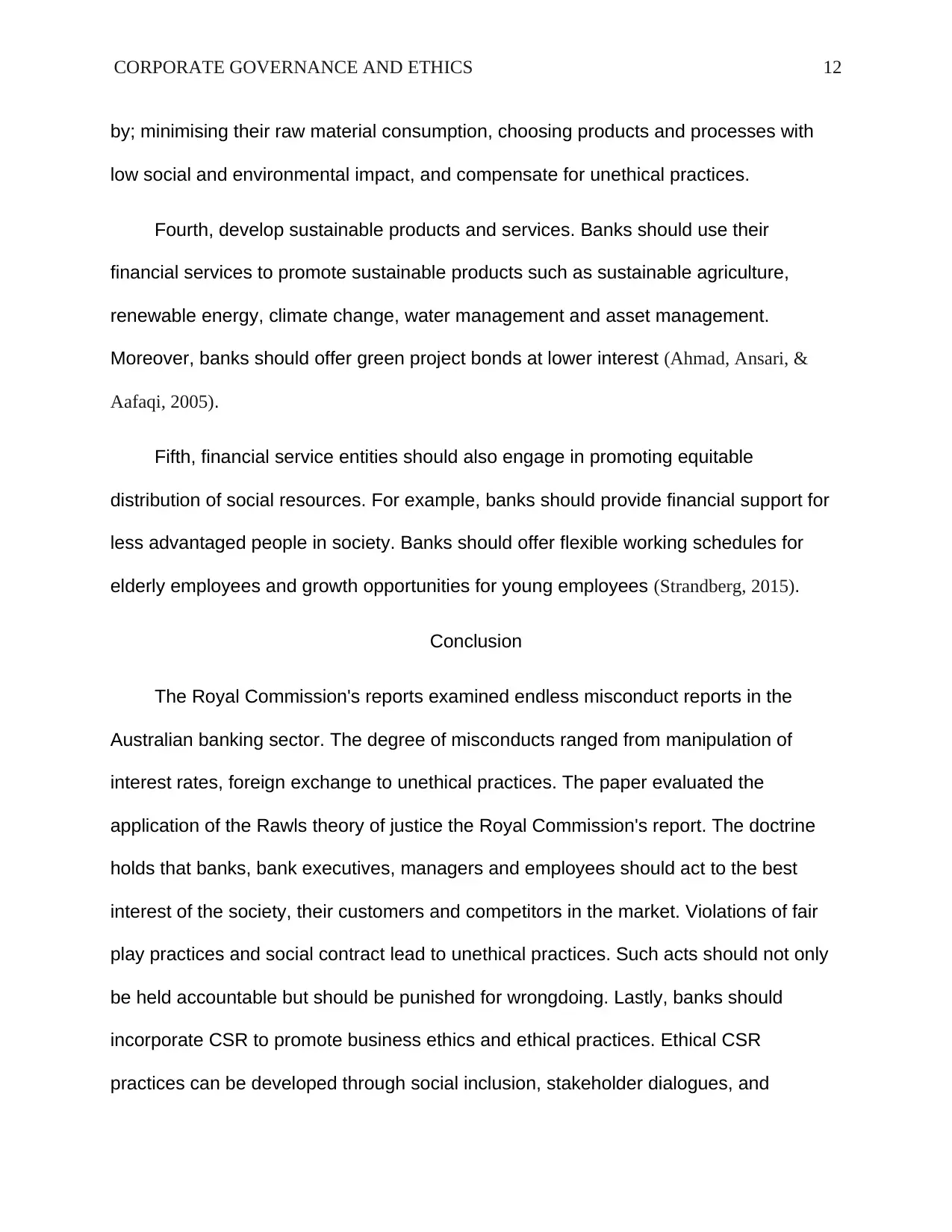
CORPORATE GOVERNANCE AND ETHICS 12
by; minimising their raw material consumption, choosing products and processes with
low social and environmental impact, and compensate for unethical practices.
Fourth, develop sustainable products and services. Banks should use their
financial services to promote sustainable products such as sustainable agriculture,
renewable energy, climate change, water management and asset management.
Moreover, banks should offer green project bonds at lower interest (Ahmad, Ansari, &
Aafaqi, 2005).
Fifth, financial service entities should also engage in promoting equitable
distribution of social resources. For example, banks should provide financial support for
less advantaged people in society. Banks should offer flexible working schedules for
elderly employees and growth opportunities for young employees (Strandberg, 2015).
Conclusion
The Royal Commission's reports examined endless misconduct reports in the
Australian banking sector. The degree of misconducts ranged from manipulation of
interest rates, foreign exchange to unethical practices. The paper evaluated the
application of the Rawls theory of justice the Royal Commission's report. The doctrine
holds that banks, bank executives, managers and employees should act to the best
interest of the society, their customers and competitors in the market. Violations of fair
play practices and social contract lead to unethical practices. Such acts should not only
be held accountable but should be punished for wrongdoing. Lastly, banks should
incorporate CSR to promote business ethics and ethical practices. Ethical CSR
practices can be developed through social inclusion, stakeholder dialogues, and
by; minimising their raw material consumption, choosing products and processes with
low social and environmental impact, and compensate for unethical practices.
Fourth, develop sustainable products and services. Banks should use their
financial services to promote sustainable products such as sustainable agriculture,
renewable energy, climate change, water management and asset management.
Moreover, banks should offer green project bonds at lower interest (Ahmad, Ansari, &
Aafaqi, 2005).
Fifth, financial service entities should also engage in promoting equitable
distribution of social resources. For example, banks should provide financial support for
less advantaged people in society. Banks should offer flexible working schedules for
elderly employees and growth opportunities for young employees (Strandberg, 2015).
Conclusion
The Royal Commission's reports examined endless misconduct reports in the
Australian banking sector. The degree of misconducts ranged from manipulation of
interest rates, foreign exchange to unethical practices. The paper evaluated the
application of the Rawls theory of justice the Royal Commission's report. The doctrine
holds that banks, bank executives, managers and employees should act to the best
interest of the society, their customers and competitors in the market. Violations of fair
play practices and social contract lead to unethical practices. Such acts should not only
be held accountable but should be punished for wrongdoing. Lastly, banks should
incorporate CSR to promote business ethics and ethical practices. Ethical CSR
practices can be developed through social inclusion, stakeholder dialogues, and
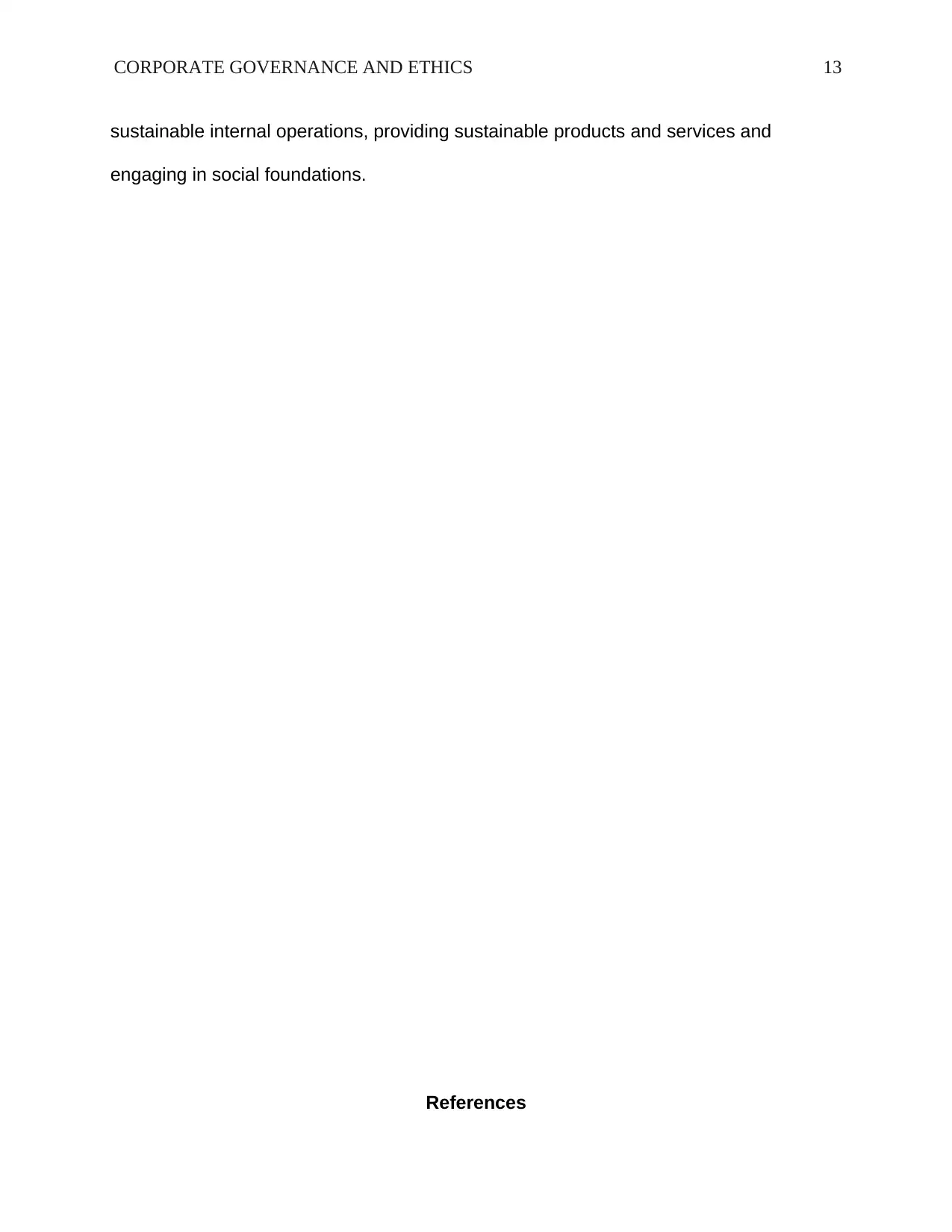
CORPORATE GOVERNANCE AND ETHICS 13
sustainable internal operations, providing sustainable products and services and
engaging in social foundations.
References
sustainable internal operations, providing sustainable products and services and
engaging in social foundations.
References
Paraphrase This Document
Need a fresh take? Get an instant paraphrase of this document with our AI Paraphraser
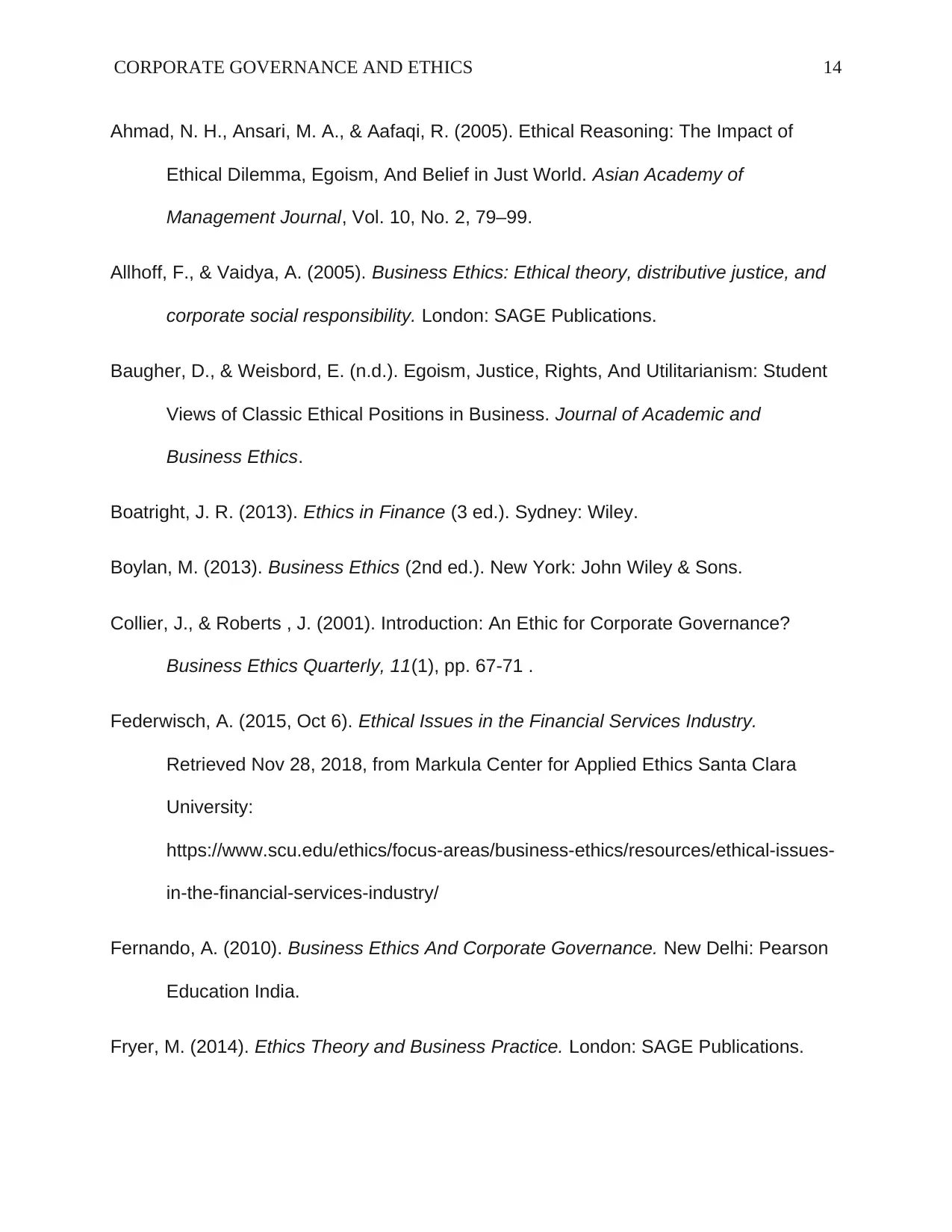
CORPORATE GOVERNANCE AND ETHICS 14
Ahmad, N. H., Ansari, M. A., & Aafaqi, R. (2005). Ethical Reasoning: The Impact of
Ethical Dilemma, Egoism, And Belief in Just World. Asian Academy of
Management Journal, Vol. 10, No. 2, 79–99.
Allhoff, F., & Vaidya, A. (2005). Business Ethics: Ethical theory, distributive justice, and
corporate social responsibility. London: SAGE Publications.
Baugher, D., & Weisbord, E. (n.d.). Egoism, Justice, Rights, And Utilitarianism: Student
Views of Classic Ethical Positions in Business. Journal of Academic and
Business Ethics.
Boatright, J. R. (2013). Ethics in Finance (3 ed.). Sydney: Wiley.
Boylan, M. (2013). Business Ethics (2nd ed.). New York: John Wiley & Sons.
Collier, J., & Roberts , J. (2001). Introduction: An Ethic for Corporate Governance?
Business Ethics Quarterly, 11(1), pp. 67-71 .
Federwisch, A. (2015, Oct 6). Ethical Issues in the Financial Services Industry.
Retrieved Nov 28, 2018, from Markula Center for Applied Ethics Santa Clara
University:
https://www.scu.edu/ethics/focus-areas/business-ethics/resources/ethical-issues-
in-the-financial-services-industry/
Fernando, A. (2010). Business Ethics And Corporate Governance. New Delhi: Pearson
Education India.
Fryer, M. (2014). Ethics Theory and Business Practice. London: SAGE Publications.
Ahmad, N. H., Ansari, M. A., & Aafaqi, R. (2005). Ethical Reasoning: The Impact of
Ethical Dilemma, Egoism, And Belief in Just World. Asian Academy of
Management Journal, Vol. 10, No. 2, 79–99.
Allhoff, F., & Vaidya, A. (2005). Business Ethics: Ethical theory, distributive justice, and
corporate social responsibility. London: SAGE Publications.
Baugher, D., & Weisbord, E. (n.d.). Egoism, Justice, Rights, And Utilitarianism: Student
Views of Classic Ethical Positions in Business. Journal of Academic and
Business Ethics.
Boatright, J. R. (2013). Ethics in Finance (3 ed.). Sydney: Wiley.
Boylan, M. (2013). Business Ethics (2nd ed.). New York: John Wiley & Sons.
Collier, J., & Roberts , J. (2001). Introduction: An Ethic for Corporate Governance?
Business Ethics Quarterly, 11(1), pp. 67-71 .
Federwisch, A. (2015, Oct 6). Ethical Issues in the Financial Services Industry.
Retrieved Nov 28, 2018, from Markula Center for Applied Ethics Santa Clara
University:
https://www.scu.edu/ethics/focus-areas/business-ethics/resources/ethical-issues-
in-the-financial-services-industry/
Fernando, A. (2010). Business Ethics And Corporate Governance. New Delhi: Pearson
Education India.
Fryer, M. (2014). Ethics Theory and Business Practice. London: SAGE Publications.
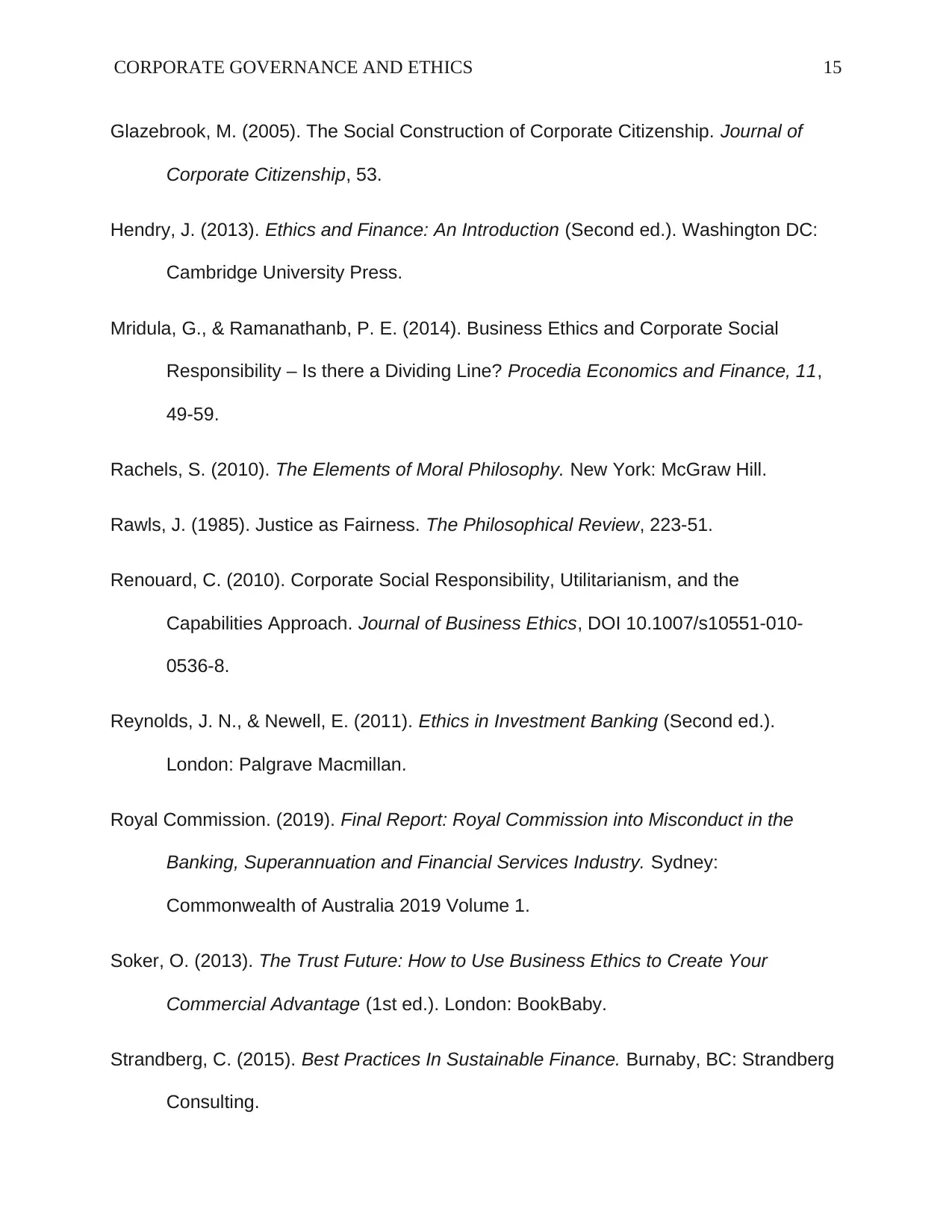
CORPORATE GOVERNANCE AND ETHICS 15
Glazebrook, M. (2005). The Social Construction of Corporate Citizenship. Journal of
Corporate Citizenship, 53.
Hendry, J. (2013). Ethics and Finance: An Introduction (Second ed.). Washington DC:
Cambridge University Press.
Mridula, G., & Ramanathanb, P. E. (2014). Business Ethics and Corporate Social
Responsibility – Is there a Dividing Line? Procedia Economics and Finance, 11,
49-59.
Rachels, S. (2010). The Elements of Moral Philosophy. New York: McGraw Hill.
Rawls, J. (1985). Justice as Fairness. The Philosophical Review, 223-51.
Renouard, C. (2010). Corporate Social Responsibility, Utilitarianism, and the
Capabilities Approach. Journal of Business Ethics, DOI 10.1007/s10551-010-
0536-8.
Reynolds, J. N., & Newell, E. (2011). Ethics in Investment Banking (Second ed.).
London: Palgrave Macmillan.
Royal Commission. (2019). Final Report: Royal Commission into Misconduct in the
Banking, Superannuation and Financial Services Industry. Sydney:
Commonwealth of Australia 2019 Volume 1.
Soker, O. (2013). The Trust Future: How to Use Business Ethics to Create Your
Commercial Advantage (1st ed.). London: BookBaby.
Strandberg, C. (2015). Best Practices In Sustainable Finance. Burnaby, BC: Strandberg
Consulting.
Glazebrook, M. (2005). The Social Construction of Corporate Citizenship. Journal of
Corporate Citizenship, 53.
Hendry, J. (2013). Ethics and Finance: An Introduction (Second ed.). Washington DC:
Cambridge University Press.
Mridula, G., & Ramanathanb, P. E. (2014). Business Ethics and Corporate Social
Responsibility – Is there a Dividing Line? Procedia Economics and Finance, 11,
49-59.
Rachels, S. (2010). The Elements of Moral Philosophy. New York: McGraw Hill.
Rawls, J. (1985). Justice as Fairness. The Philosophical Review, 223-51.
Renouard, C. (2010). Corporate Social Responsibility, Utilitarianism, and the
Capabilities Approach. Journal of Business Ethics, DOI 10.1007/s10551-010-
0536-8.
Reynolds, J. N., & Newell, E. (2011). Ethics in Investment Banking (Second ed.).
London: Palgrave Macmillan.
Royal Commission. (2019). Final Report: Royal Commission into Misconduct in the
Banking, Superannuation and Financial Services Industry. Sydney:
Commonwealth of Australia 2019 Volume 1.
Soker, O. (2013). The Trust Future: How to Use Business Ethics to Create Your
Commercial Advantage (1st ed.). London: BookBaby.
Strandberg, C. (2015). Best Practices In Sustainable Finance. Burnaby, BC: Strandberg
Consulting.
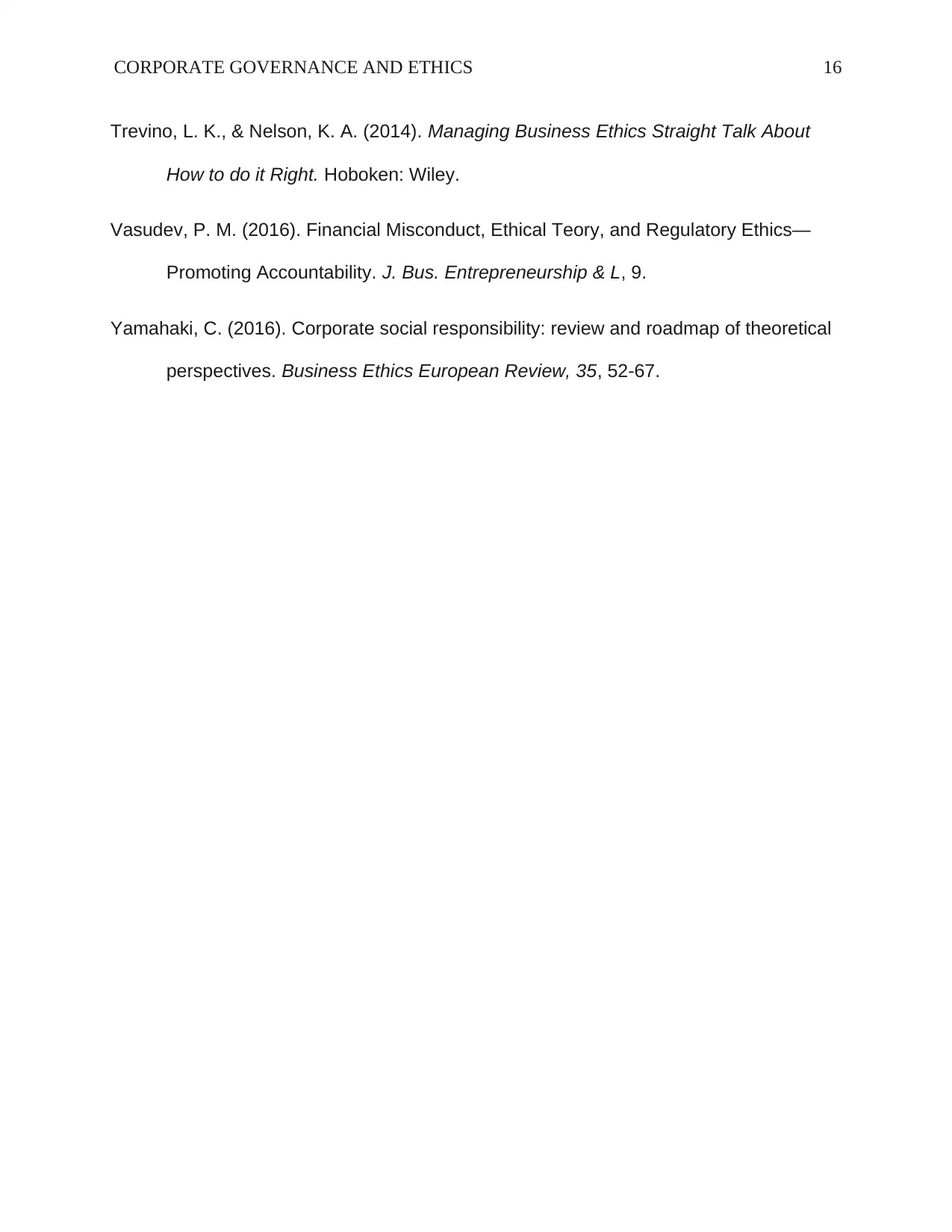
CORPORATE GOVERNANCE AND ETHICS 16
Trevino, L. K., & Nelson, K. A. (2014). Managing Business Ethics Straight Talk About
How to do it Right. Hoboken: Wiley.
Vasudev, P. M. (2016). Financial Misconduct, Ethical Teory, and Regulatory Ethics—
Promoting Accountability. J. Bus. Entrepreneurship & L, 9.
Yamahaki, C. (2016). Corporate social responsibility: review and roadmap of theoretical
perspectives. Business Ethics European Review, 35, 52-67.
Trevino, L. K., & Nelson, K. A. (2014). Managing Business Ethics Straight Talk About
How to do it Right. Hoboken: Wiley.
Vasudev, P. M. (2016). Financial Misconduct, Ethical Teory, and Regulatory Ethics—
Promoting Accountability. J. Bus. Entrepreneurship & L, 9.
Yamahaki, C. (2016). Corporate social responsibility: review and roadmap of theoretical
perspectives. Business Ethics European Review, 35, 52-67.
1 out of 16
Related Documents
Your All-in-One AI-Powered Toolkit for Academic Success.
+13062052269
info@desklib.com
Available 24*7 on WhatsApp / Email
![[object Object]](/_next/static/media/star-bottom.7253800d.svg)
Unlock your academic potential
© 2024 | Zucol Services PVT LTD | All rights reserved.





